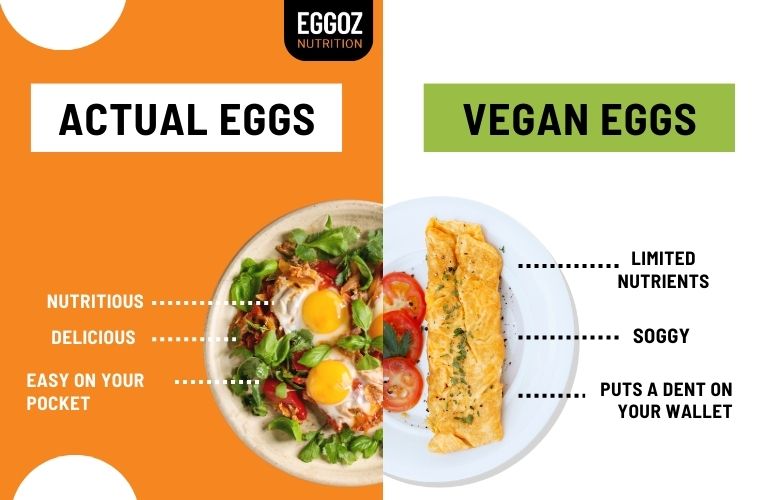Are eggs considered vegetarian in India?
Well! In a country where vegetarianism is deeply ingrained in the culture, the emergence of vegan eggs presents a great alternative.
This adds a question, "Which is healthier: eggs made from various wholesome ingredients or actual eggs?"
This blog will provide the background of vegan and actual eggs, and we’ll compare them in terms of production and nutritional value, and then draw a conclusion based on the insights gathered.
Background
Eggs, sourced from birds, have been a dietary mainstay for centuries, valued for their protein, vitamins, and versatility. They're used in various cuisines, from simple hard boiled eggs to complex pastries. Worldwide egg production reached its peak in 2020, with 1.65 trillion produced eggs. In contrast, vegan eggs are a recent innovation designed to mimic chicken eggs' taste, texture, and nutritional value without animal products. The worldwide market for vegan eggs will be worth $1.77 billion in the year 2023. They're made from ingredients like moong bean protein, soy, or aquafaba (chickpea water), catering to those who avoid animal products for health, ethical, or environmental reasons.
Meanwhile, original eggs in India continue to be a staple in many diets, valued for their protein and vitamins.
What is the difference between vegan eggs and regular eggs?
In essence, the choice between vegan and regular eggs is not just about dietary preferences but also about broader considerations like composition, origin, and nutritional profiles. Vegan eggs are still a work in progress in terms of taste and they are expensive as well.
Meaning and Production
- Actual Eggs: Eggs are a natural animal product laid by birds, primarily chickens. The production involves rearing poultry under various conditions, ranging from free-range to factory farming.
- Vegan Eggs: are plant-based alternatives designed to mimic chicken eggs' taste, texture, and culinary uses. They are made from besan, flaxseeds, tofu, and various binding and flavouring agents.
Nutritional Count for Actual Eggs and Vegan Eggs
When comparing the nutritional content, it's essential to consider factors like protein content, omega 3 fatty acid, and micronutrients for both regular eggs and veg eggs in India.
Nutrition in Actual Eggs:
- Protein Content: A standard large egg contains approximately 6 grams of high-quality protein.
- Omega 3: One large egg typically has about 186 milligrams of omega 3 healthy fats located exclusively in the yolk.
- Calories: A large egg has around 70 to 78 calories.
- Vitamin D & B12: A large egg provides about 0.6 micrograms of Vitamin D & B12, equating to roughly 25% of an adult's daily recommended intake.
Nutritional in Vegan Eggs (Considering Mung Bean Protein):
- Protein Content: Vegan eggs made from mung bean protein typically contain 5 grams of protein per serving, equivalent to a regular egg.
- Cholesterol: Vegan eggs have 0 milligrams of cholesterol, making them a heart-healthy alternative.
- Calories: A serving of vegan eggs made from mung bean protein usually ranges between 70 calories, similar to a regular egg.
- Fibre Content: Unlike traditional eggs, vegan eggs with mung bean protein often contain dietary fibre, averaging around 1-3 grams per serving.
Original eggs & vegan eggs in India review:
- Original Eggs in India: "I find them to be a reliable and versatile source of high-quality protein and essential nutrients, perfect for a variety of dishes."
- Vegan Eggs in India: "I appreciate them as a health-conscious and environmentally friendly alternative, aligning well with my dietary preferences."
Which is more preferable?
While both regular eggs and vegan eggs have their advantages, there are several reasons why one might prefer regular eggs over their vegan counterparts. Firstly, original eggs in India are a complete protein source, containing all nine essential amino acids the body cannot produce independently. This makes them highly beneficial for muscle growth, repair, and overall bodily functions.
In contrast, veg eggs in India rely on a combination of plant-based proteins, which may not always offer this complete amino acid profile. Moreover, regular eggs are a staple in many diets worldwide, readily available in most grocery stores, and typically more affordable than specialty vegan alternatives. Additionally, the taste and texture of regular eggs are familiar to many people, making them a more appealing choice in terms of culinary applications.
Conclusion:
The choice between vegan and actual eggs depends on various factors, including dietary preferences, health considerations, and ethical concerns. Nutritionally, both have their merits, but one outweighs the other. For those seeking the healthiest option in this category, Eggoz Nutrition Eggs stand out. Specially produced with a focus on optimal nutritional content and quality, Eggoz Nutrition offer a superior choice for health-conscious consumers. You can easily buy eggs online to get them delivered to your doorstep. Unlike plant-based alternatives, regular eggs provide nutrients in a readily available form, making them an integral part of a nutritious diet.
FAQs
Can veg eggs in India become a substitute for regular eggs in all recipes?
Vegan eggs can be substituted for regular eggs in many recipes. However, vegan alternatives might not provide an exact match in recipes where the distinct flavour or texture of traditional eggs is fluffiest. Experimenting to find the right fit for each recipe is always best.
Is it healthy to eat original eggs in India every day?
For most people, eating an egg a day can be part of a healthy diet. Eggs are a good source of high-quality protein and various essential nutrients. However, individuals with specific health conditions like high cholesterol or diabetes should consult with a healthcare professional for personalised dietary advice.
What Makes Eggoz Nutrition Eggs Different from Regular Eggs?
Eggoz Nutrition Eggs are specially produced to offer higher nutritional value than regular eggs. They are often enriched with additional vitamins and minerals, ensuring a richer intake of essential nutrients.


